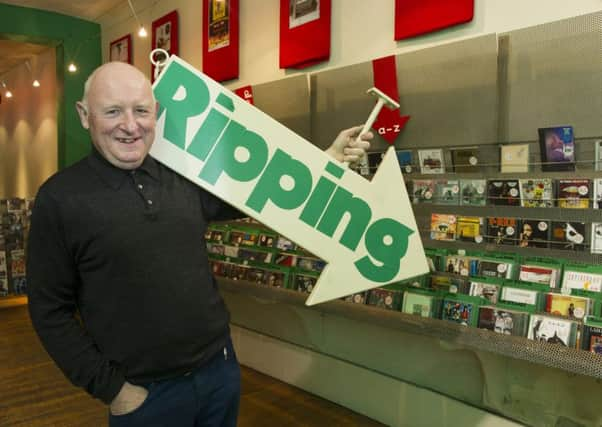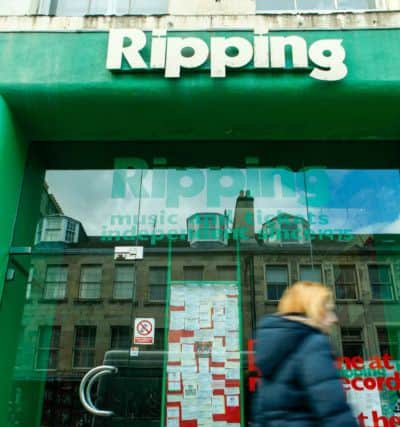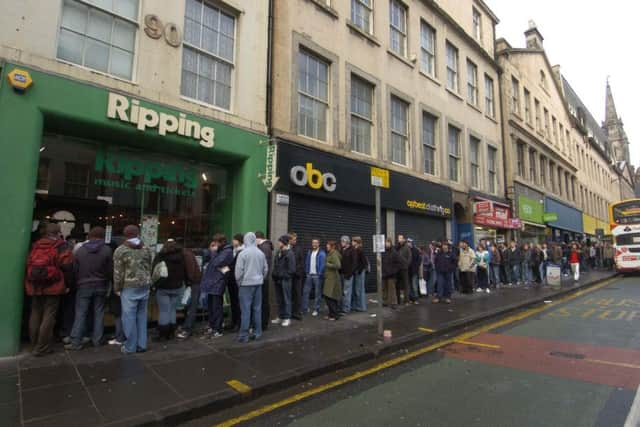Edinburgh music institution Ripping Records to close after 41 years


From The Rezillos to Robbie Williams, Oasis at Loch Lomond to the very first T in the Park – Ripping Records was the place to go.
Now the shop will play its final encore this month with the curtain set to fall on Saturday, November 26 as it closes its doors for good.
Advertisement
Hide AdAdvertisement
Hide AdOwner John Richardson has decided to retire after 41 years of crystal-clear, high fidelity that has seen the independent store stave off the threat from the majors like HMV and Virgin while carving out a niche as the “go-to place” for gig tickets.


The 61-year-old, originally from Slateford, has a treasure trove of memories that he’ll take on to the 1st hole at Gullane Golf Club with the aim of improving his handicap in retirement.
He said: “I’m retiring, I’m 61 and I’ve done this for 41 years – I’ve had a couple of wee health problems and the doctor said I was probably doing too many hours.
“So I just thought it was time to retire. I’ve had a fantastic time – a pretty successful time – and it’s time to call a halt.
“It’s been unbelievable, I say to people all the time – I’ve never had a proper job. You get up, you come in and you play records all day and talk to really nice people who are interested in what you’re doing.


“The big thing about working in a place like this is the people are here because they are interested, it’s not a chore, it’s a pleasure.”
John’s memories are a veritable who’s who of the last 40 years of the Scottish music scene.
Advertisement
Hide AdAdvertisement
Hide AdHe describes how Oasis fans camped out overnight and queued round the block for their Loch Lomond gig in 1996 and how festival-goers brought the traffic on the South Bridge to a standstill in their quest for T in the Park briefs.
He said: “The biggest one ever was Oasis at Loch Lomond, that was just insane. We had a queue that went from the shop along the South Bridge going North, down Blair Street, round the Cowgate and back up Niddry Street – it was brilliant.


“We also had people camping out for T in the Park tickets and I remember waking up at 7am one morning after the alarm went off and it was the traffic report saying that the South Bridge was closed with people waiting outside Ripping Records to get tickets for T in the Park – it was total mayhem, the police had to cordon off what’s now the bus lane.
“The great thing about the queues was it was always good natured and people really enjoyed it – they made friends with other people in the line.”
But it’s John’s stories of a nascent Billy Mackenzie and Alan Rankine – The Associates – that provide a snapshot of what the shop was like over 30 years ago.
He said: “The people we knew best were The Associates, Billy Mackenzie and Alan Rankine. The first time I ever met Billy he came in with an empty bottle of vodka in his bag.


“They’d recorded their first ever single which was a cover of Bowie’s Boys Keep Swinging, so Billy came in and in his broad Dundonian accent said ‘I’ve got this record’.
Advertisement
Hide AdAdvertisement
Hide Ad“I put it on and couldn’t believe what I was hearing, it was brilliant – I said, ‘did you sing that?’ and he was like ‘yeah, yeah, that’s me’.
“He had a pile of records that he brought up from London and he asked me if we could keep them in the shop.
“So we kept them, sold some and gave Billy a couple of boxes when he needed them.
“They used to come in on a Saturday and we would go round to Valentine’s Bar in the High Street and knock back the Stella Artois.
“Billy was a lovely guy, he used our shop like a warehouse – they were in the shop a lot.
“I only saw them play once at the Citrus Club, right at the start of their careers and they were both phenomenally talented.”
John tells how American songwriter Bruce Hornsby, who was at the Playhouse with his band the Range, wandered into the store one day.
Advertisement
Hide AdAdvertisement
Hide AdHe said: “I remember once Bruce Hornsby came into the shop and this was when he was at his height with his band the Range. They were playing the Playhouse and he was going through the 12in singles.
“Well he picked out two Bruce Hornsby records!
“He was about to pay by credit card and I asked him if he could explain why he was buying his own records.
“He said that he’d never heard these versions, because what they would do in the 80s with 12in singles was just remix them and often the artist would never hear them. I said to him, just sign the visa slip and I’ll keep it as a souvenir and never present it – I’ve still got it somewhere – he was a lovely guy.
“I also remember Elvis Costello came in once and he was looking for a Los Lobos album I think.”
Former Simple Minds manager and independent record shop owner Bruce Findlay said: “John is a bit younger than me but started out when we were on the go and I had Bruce’s Record Shop.
“To me Ripping closing is like the end of an era, of that period, the glory days if you like, of the independent record shop – ironically, I think these days might be about to return.
“I am glad he is genuinely retiring. He’s done his stint, it’s a shame because it would have been nice to have seen somebody take it over. He’s part of that group of people that are mavericks and without him the shop wouldn’t be the same. John is so well known in the scene and the guys who worked for him became well known in the music scene as well.”
Advertisement
Hide AdAdvertisement
Hide AdHe added: “The uniqueness of an independent record shop involves customers taking part in the theatre of a shop by going in and browsing.
“Real vinyl junkies if you like, real music fans, there might be a lot of fanatics who are now divided between people who like to collect whether it’s CDs or vinyl and people who like to download their music. It’s a bit like books, people were worried bookshops would be killed by Kindle but it’s not happened.
“John caught the tail end of the original independent shops like Bruce’s, then came the era of the megastores and he survived that, this made him unique, he switched his attention to concert tickets and became a legend.
“He would sell tickets for the daft wee punks that major ticket outlets wouldn’t give a damn about, so he was selling tickets for gigs at Sneaky Pete’s or Cabaret Voltaire for small up-and-coming bands.”